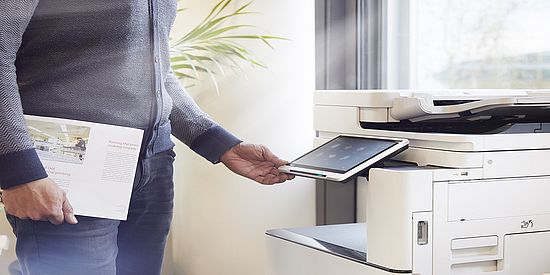
Redesign UNIprint
Modernization of the central printing environment for staff, students and private users at the University Library.
For many years, the "paperless office" has been propagated as a goal of a modern working environment. However, "paperless" does not just mean simply printing less, but also being able to use the teaching and research environment as well as internal business processes without paper. The University of Basel has already optimised its processes in many places with regard to reduced paper consumption, but there is still a need to have easy and quick access to printers at the workplace and also in studies. All the more so, as printers are nowadays equated with so-called multifunctional devices, which also represent an easy-to-use option for scanning documents and converting them directly into PDF documents with text recognition. This function then also supports the progressive digitization of processes.
Other aspects of a modern printing environment are efficient management of the devices, high flexibility and, last but not least, data protection and data security. The last two aspects in particular are of great importance, which is why IT Services has been using so-called "Follow-Me" printing for many years. This makes it possible to print documents at currently over 100 devices in the UNIprint network using a personal card. Thanks to this function, the topic of "environmental protection" can also be addressed, as unnecessary or uncollected printouts are reduced to a minimum.
With the comprehensive introduction of the new UNIcard at the University of Basel in 2019, the opportunity was taken to modernise a system that has been in use for many years and to make it available to the entire user community of the university.

IT Services has been offering the "UNIprint" service since around 2006. For this purpose, an environment was created which enables employees, students and private users at the University Library to print, copy and scan documents on a variety of multifunction devices (printers for short).
In the absence of a standard card for staff or a usable "Legi" for students, a dedicated "UNIprint card" was used without any further function. So-called "moneyloaders" were operated, at which cash could be loaded onto one's own "UNIprint card", or the cards were charged directly to an internal cost centre. The operation of the money loaders and the dedicated UNIprint cards required an elaborate and complex accounting system.
In the more than 13 years of operation of UNIprint, approximately 40,000 UNIprint cards were put into circulation and mid 6-digit amounts were turned over annually. Nevertheless, UNIprint was evaluated differently within the university and thus did not find the desired widespread use. An analysis in 2016 revealed a total of approximately 1000 network-enabled printers within the university with a print volume of approximately 12.5 million pages. Of these 1000 devices, the approximately 70 UNIprint printers at the time were responsible for more than one-fifth (2.6 million prints) of the print volume.
In 2017, the administrative directorate announced the "UNIcard" which was introduced across the board at the beginning of 2019. In addition to the function of an ID card, the new "UNIcard" also offers the possibility of a payment function or as an access control for buildings.
In order to benefit from the advantages of the UNIcard, the administrative management commissioned the "Redesign UNIprint" project.

The motto of the project launched in summer 2018 was: "Keep what is good and improve what is less good".
In close cooperation with the suppliers (Materialzentrale Basel-Stadt, Canon Switzerland) and the internal partners (in particular the University Library and the IT Service Centers), a new UNIprint environment was designed.
A major challenge for the project was that there could be no "creeping" introduction, but the complete system with its then approx. 70 UNIprint printers had to be converted at once - as a so-called "big bang change". Accordingly, the cooperation with all parties involved had to function well. In a pilot phase, the printers of the IT services were changed over in order to test and optimise the service.
Another challenge was to implement the most automatic transfer possible of card credit from the old UNIprint card to the new UNIcard. Since the old UNIprint card was impersonal and only a few users had stored their email address, only a fraction of the existing card credits could be transferred automatically. For all remaining cards, so-called "credit transfer stations" were set up at three locations, where credit could be transferred from the old to the new UNIcard.
The new UNIprint environment was successfully rolled out on 09 May 2019. Since then, the number of printers has increased continuously to over 120 devices (as of January 2020) and several million pages have been printed, copied and scanned.

The "Redesign UNIprint" project has once again shown that in supposed "technology projects" the greatest effort is not in the design and construction of the infrastructure, but in the so-called "stakeholder management", i.e. working with all those involved and affected. Furthermore, the adaptation and modernization of existing processes and procedures in the foreground and background were intensive work and a very large part of the project effort.
After 8 months of operation, the new UNIprint can be considered a success with a clear conscience, as the intended goals have been achieved, the new UNIprint is being used intensively and the printer park is being steadily expanded.
We would like to thank all those involved in the project, both inside and outside the University of Basel, for their excellent cooperation.
Links & Downloads
(Kopie 10)
Quick Links
